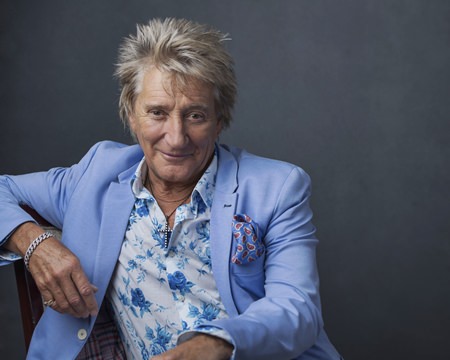
New York (AP) — More than fifty years into his career, Rod Stewart shows no sign of slowing down.
When he’s not on tour, he’s busy at home chasing his two young sons, Aiden and Alastair, around the yard. And on Sept. 28, he will release his 30th studio album, “Blood Red Roses.”
While known for writing sultry songs — from “Tonight’s the Night (Gonna Be Alright)” to “You’re In My Heart (The Final Acclaim)” — Stewart’s also not afraid to tackle social issues. In 1976, he broke new ground with “The Killing of Georgie (Part I and II),” about his friend who was killed because of his sexual identity.
Stewart dismisses the idea of being courageous writing the first mainstream pop song to deal with gay bashing.
“It was a true story and it’s much easier to write about the truth,” Stewart said about the iconic song.
The 73-year old crooner gets serious again with his new album’s first single, “Didn’t I,” which deals with teenage substance abuse from the parent’s perspective.
In an interview with The Associated Press, the Grammy-winning singer discussed his longevity in the music business, what he thinks of the #MeToo movement and maintaining his signature hairstyle.
AP: That hair is just amazing. How do you keep it up?
Stewart: It’s pretty good, isn’t it? I don’t know. I think I’ve just been lucky, you know, with the hair. It gets a lot of manipulation, you know, because I always have to keep it (up). When I’m doing a show, I have to go and dry it. …I cut it every two weeks. No, but other than that I just think I’m lucky.
AP: You move pretty well onstage for a guy in his seventies…
Stewart: Soccer has always been a passion of mine. You know, I played it, read about it, watched it all my life, and I still play a little bit. And I do work out a lot, I must admit. And that keeps me fit for onstage. How long can I go on? That’s the million-dollar question. You know, I enjoy it. I get excited about it, and as long as that exists, I think I can carry on for another three weeks (laughs).
AP: You’ve always been a fan of the ladies, do you consider yourself a sex symbol?
Stewart: Sex symbol? Now I hate that word. ..I never purposely went out to attract the opposite sex. I mean, it just comes with the music, you know, the music is very sensuous and vibrant. So, if I do something suggestive onstage it’s merely by accident.
AP: The industry has changed. Is it no longer sex, drugs and rock ‘n’ roll?
Stewart: Obviously, I’m not, you know, sweet 16 anymore, and there are things I have to preserve, namely my voice. I really have to look after that. So, as I said, I was never really a druggy-type person because I played football and I was always getting up in the morning playing football and so that side hasn’t changed a great deal for me.
AP: But things are changing, especially with the #MeToo movement.
Stewart: Well that’s true. There were a lot of women throwing themselves at us in the ’70s and ’80s, and they were good old times, really great times. But, you know, the #MeToo movement is long overdue. But I must admit I’ve never had trouble, you know, entertaining women. I’ve always enjoyed the chase, actually. I’d never thrown myself on any woman. You know, I enjoyed romance and then the chase.
AP: Do you ever look back and go, “Wow, what a career?”
Stewart: Every day. Every day. I never take it for granted. I really don’t. You know, it’s just the best job in the world. I know that’s an old cliche, but it really is.
 |
 |





